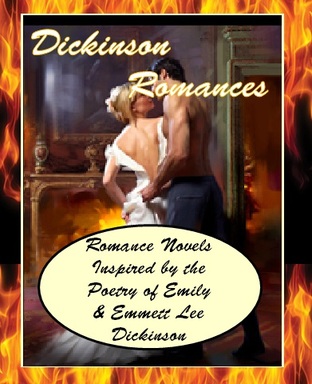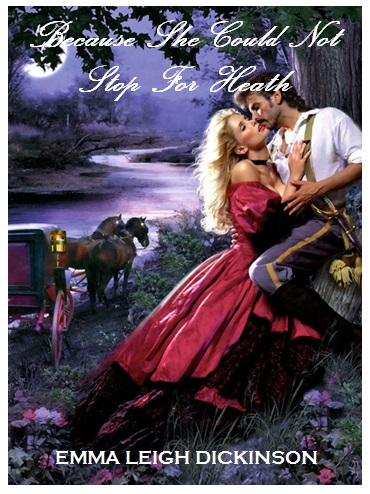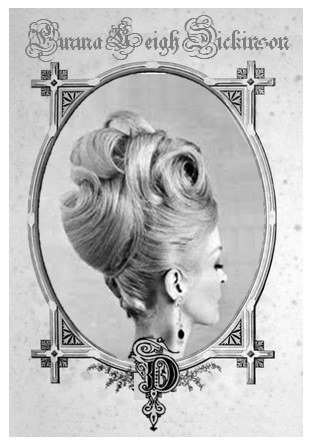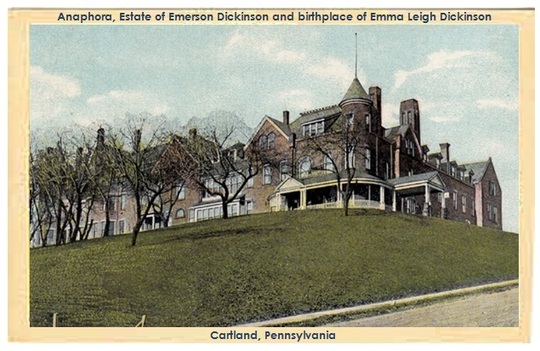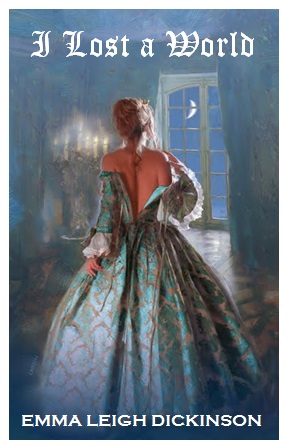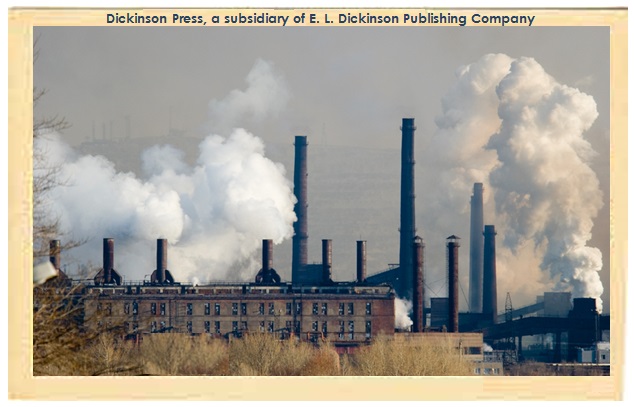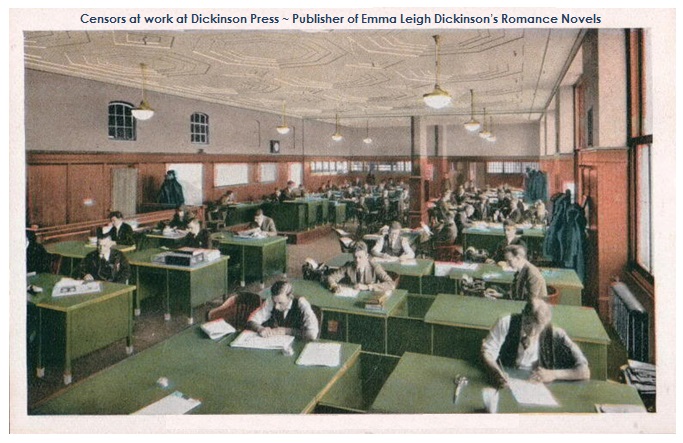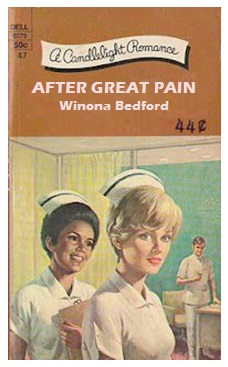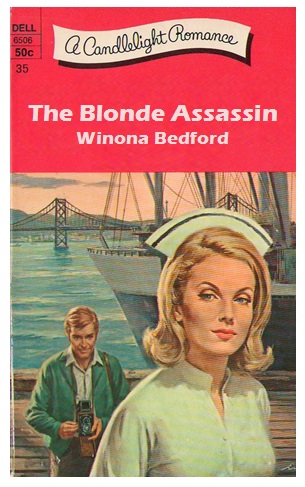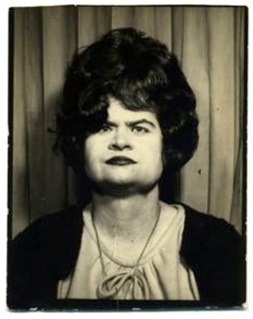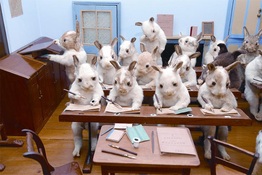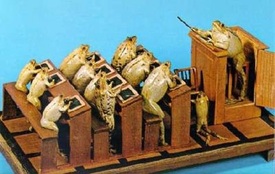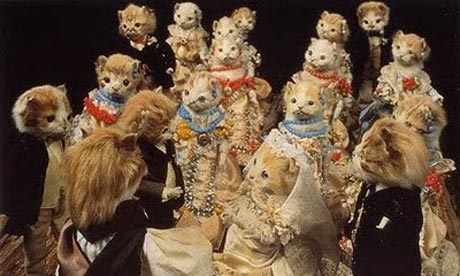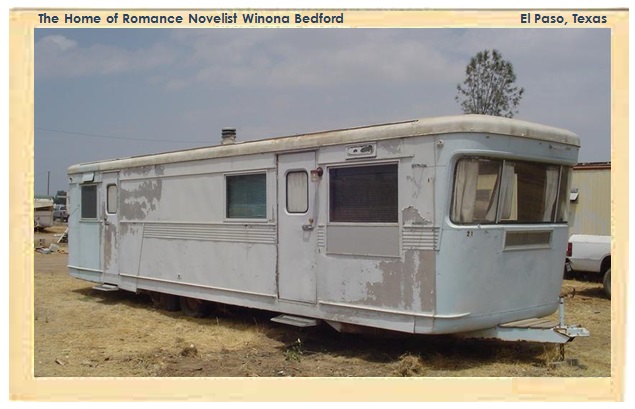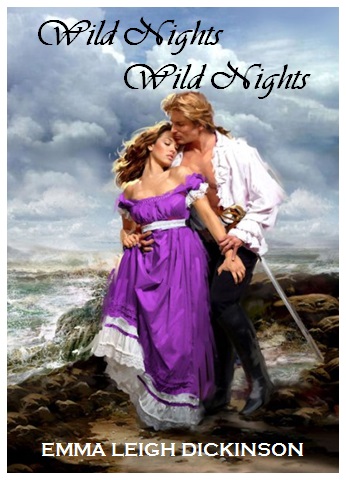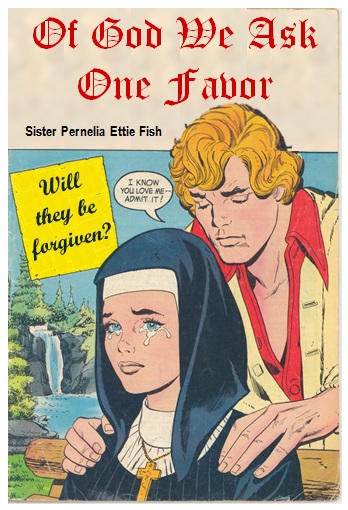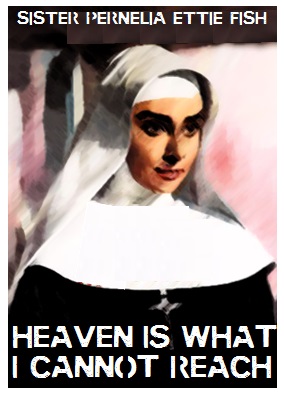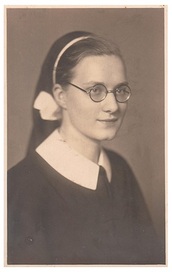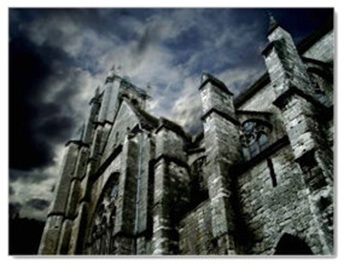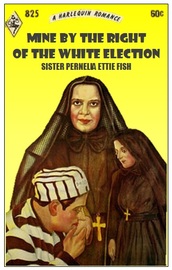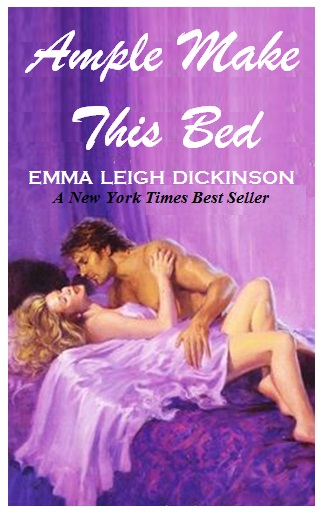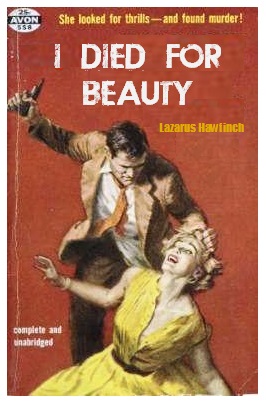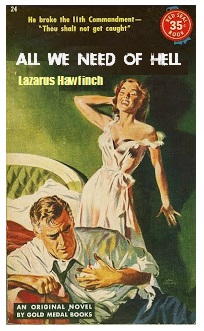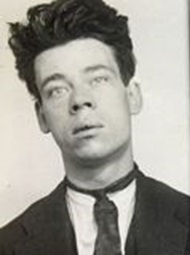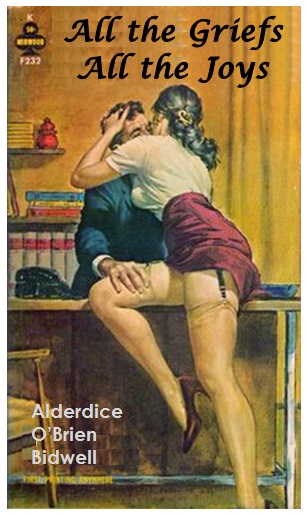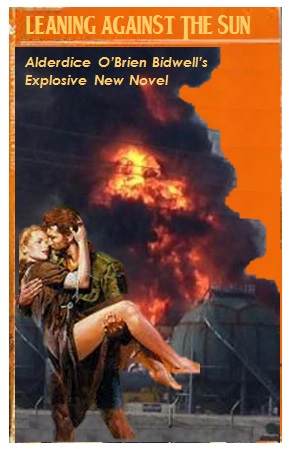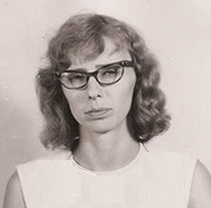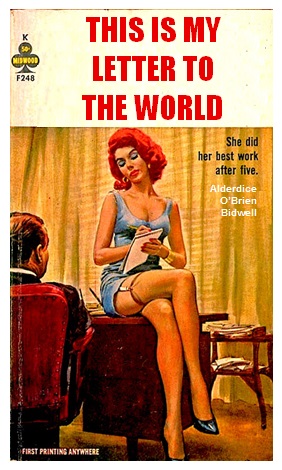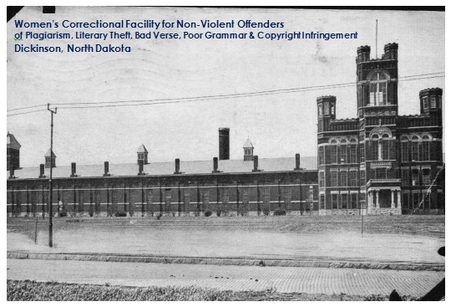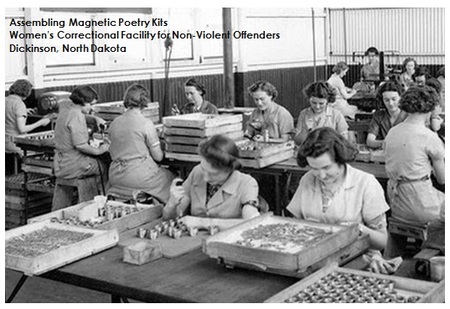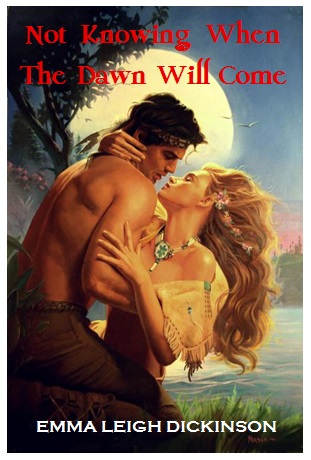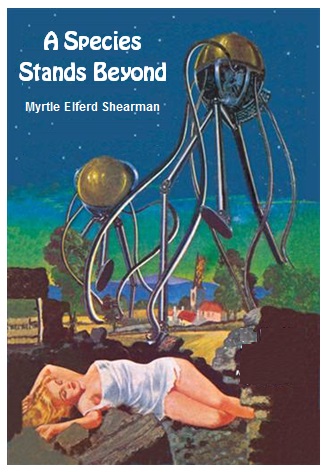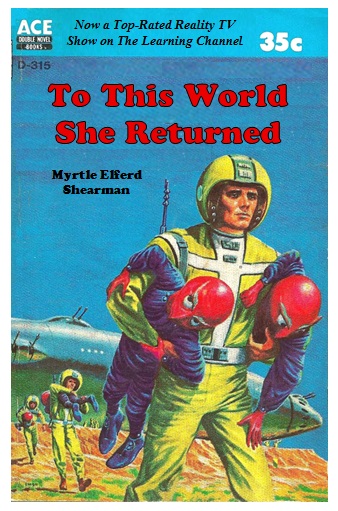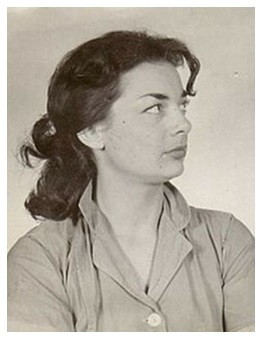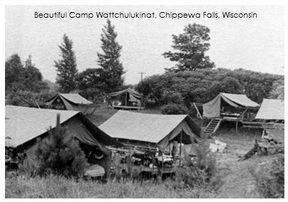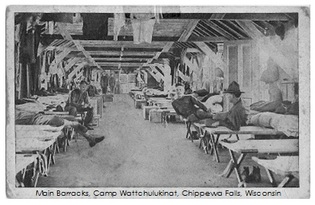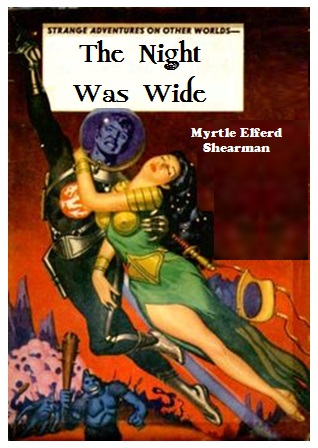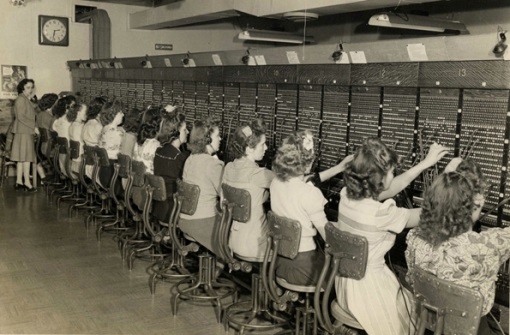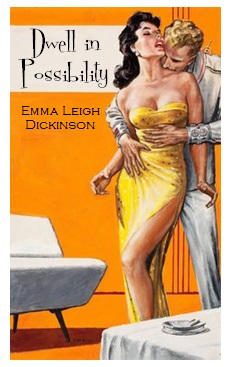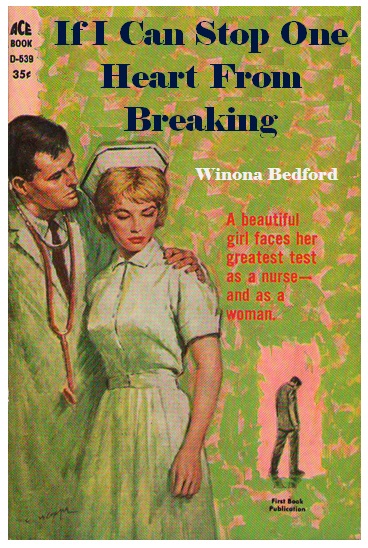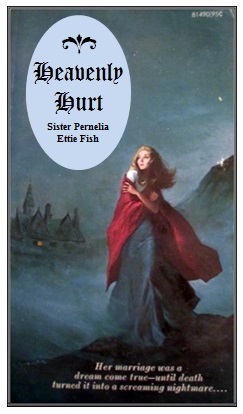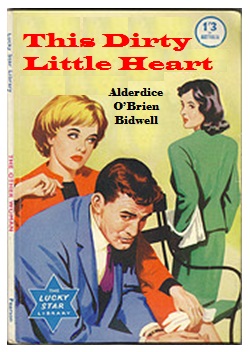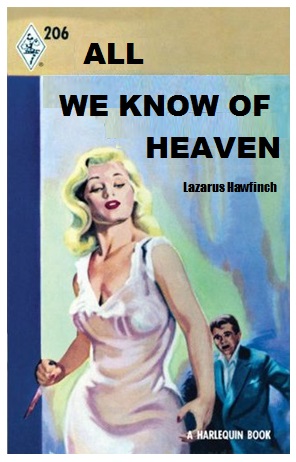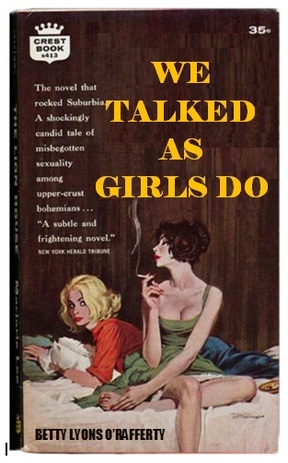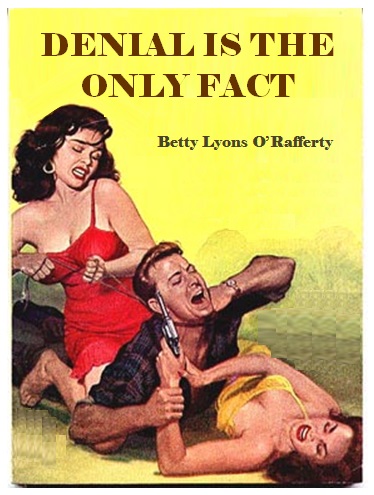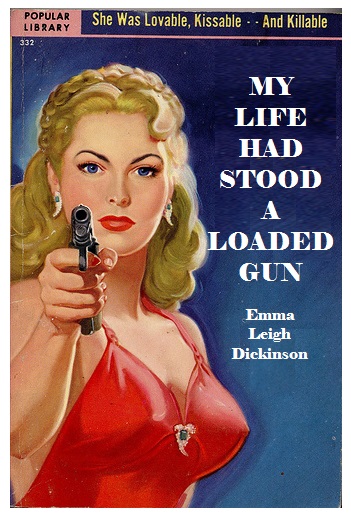January 1Pictured at the right: The top selling romance novel of all time, Because She Could Not Stop For Heath, was written by the top selling Romance novelist, Emma Leigh Dickinson, the great-great-grand niece of Emmett Lee Dickinson (Emily Dickinson's third cousin, twice removed -- at her request).
In Because She Could Not Stop For Heath, Heath kindly stopped for the heroine Emily. With her tippet only tulle, the carriage held but just themselves -- and immortality! He slowly drove, he knew no haste, and Emily had put away her labor and her leisure, too, for his civility. They passed the school where children strove at recess in the ring. They passed the fields of gazing grain, and ultimately -- they passed the setting sun! They paused behind a house and -- scarcely visible -- they became a swelling on the ground. To Emily, the entire ride felt shorter than a day, but realized that when she first surmised the horses' heads, they were heading toward eternity! |
January 2
|
Pictured above:
Emma Leigh Dickinson, the top-selling romance novelist of all time. Dickinson is the great-great-grand niece of America's greatest poet, Emmett Lee Dickinson (Emily Dickinson's third cousin, twice removed -- at her request). |
The top-selling author of romance novels is Emma Leigh Dickinson, the great-great-grand niece of Emmett Lee Dickinson (Emily Dickinson's third cousin, twice removed -- at her request). Emma Leigh Dickinson wrote close to two thousand romance novels, many based on poems by her distant relatives Emily Dickinson and Emmett Lee Dickinson. Some of her best-selling titles are Wild Nights! Wild Nights!, Because She Could Not Stop For Heath (above), and The Sun Just Touched the Morning
Pictured below: Anaphora, the estate of Emerson Dickinson, and the birthplace of Emma Leigh Dickinson. Anaphora is located in Cartland, PA, and is open daily for tours. |
January 3
|
Pictured at the left: Emma Leigh Dickinson's first romance novel, I Lost A World,.
In I Lost A World, Daphne Bolet worked as an administratrix for a linen manufacturer until her world was turned upside down when she met Lord Nigel Wellwood Black. A rich man might not have noticed her, but not so with Lord Wellwood Black. He was immediately smitten by Daphne's beauty! To symbolize his love, Lord Wellwood Black presented Daphne with a tiara, a row of stars around her forehead bound, worth more Esteem than Ducats! Daphne's life changed forever, until she lost the tiara, Nigel's love-- and her entire world! Need a cover for a Romance novel? Check out the works of cover artist James V. Griffin! |
Below: Emily Dickinson's poem which inspired Emma Leigh Dickinson's romance novel:
I lost a World - the other day! Has Anybody found? You'll know it by the Row of Stars Around its forehead bound. A Rich man — might not notice it -- Yet — to my frugal Eye, Of more Esteem than Ducats -- Oh find it — Sir — for me! |
January 4
|
Pictured at the right: Dickinson Press, a subsidiary of E. L. Dickinson Publishing Company. Dickinson Press is the top producer/publisher of Romance novels in the world, and they are the exclusive publisher of Emma Leigh Dickinson's romances, including such titles as Because She Could Not Stop For Heath, I Lost A World, The Sun Just Touched The Morning, Ample Make This Bed, and Heaven Is What I Cannot Reach. |
|
Pictured at the left: Censors at work at Dickinson Press.
Censors still work at Dickinson Press to this day; however, in the early 1900s through about 1974, censors accounted for the highest number of employees in the entire company compared to all other positions. One reason for the high number of censors employed was the high number of romance novels churned out by Emma Leigh Dickinson. More than 200 words were censored from Emma Leigh Dickinson's first novel, I Lost A World (shown above), including the following:
|
January 5
|
Pictured at the right: Another author's name synonymous with Dickinsonian romance novels is Winona Bedford. Bedford's classic novel After Great Pain, based on Emily Dickinson's poem "After great pain, a formal feeling comes," has sold millions of copies.
In After Great Pain, half-sisters Elsa Arnedelle and Anna Bishop work as nurses at a hospital near a ski resort in Sun Valley, Idaho. Their lives are turned upside down when Prince Kristoff Wyldeman of Finland is admitted to the hospital after a freak skiing accident. Anna, whose nerves sit ceremonious like tombs, falls for the prince as her heart questions was it he she had encountered on the slopes just yesterday -- or centuries before? (Time travel is an important plot element in many of Bedford's novels.) In the Intensive Care Unit, Anna's feet, mechanical, go round -- while half-sister Elsa falls for Prince Kristoff's valet, Olaf Snowden. For Anna, though, this is the hour of lead as Prince Kristoff recollects the accident -- and the snow! Upon Prince Kristoff's death, Anna first feels chill -- then stupor. Ultimately, Elsa has to convince her to move on with her life and "let it go -- just let it go." Overcome with grief, Anna's heart attains a quartz contentment -- like a stone. She resigns from her position at the hospital and begins work in a rent-to-wear formal dress and tuxedo shop. Dickinson's poem and Bedford's novel were the inspiration for Disney's recent animated movie Frozen. |
|
After great pain, a formal feeling comes --
The Nerves sit ceremonious, like Tombs -- The stiff Heart questions was it He, that bore, And Yesterday, or Centuries before? The Feet, mechanical, go round -- Of Ground, or Air, or Ought -- A Wooden way Regardless grown, A Quartz contentment, like a stone -- This is the Hour of Lead -- Remembered, if outlived, As Freezing persons, recollect the Snow -- First — Chill — then Stupor — then the letting go -- |
At the left: Emily Dickinson's poem that inspired Winona Bedford's classic romance After Great Pain (above on the right).
At the right: Emily Dickinson's poem that inspired Winona Bedford's best-seller The Blonde Assassin (below on the left). |
Apparently with no surprise
To any happy Flower The Frost beheads it at its play -- In accidental power -- The blonde Assassin passes on -- The Sun proceeds unmoved To measure off another Day For an Approving God. |
January 6
|
Pictured at the left: Another best-seller from Winona Bedford is The Blonde Assassin, the title of which is taken form Emily Dickinson's poem "Apparently with no surprise." The Blonde Assassin is an unusual romance novel in that the two main characters are murderers. Nurse Marion Frost works at hospital in Mystic, Connecticut, along side her lover, Dr. Royal Lee Hartless, who influences Nurse Frost to murder a number of patients. Nurse Frost commits murder after murder and proceeds, unmoved, to measure off another day for her approving Doc. Frost goes too far, though, when she beheads elderly patient Forsythia Fittleworth as if at play. Local newspaper photographer Charley Flowers suspects that the hospital deaths are beyond accidental power, and he begins to investigate the medical staff. Soon, the amorous Nurse Frost turns her attention from Dr. Hartless to the suspicious reporter. Will Flowers -- apparently with no surprise -- be Frost's next victim? |
January 7
|
Who was Winona Bedford? She is one of the top selling romance novelists of all time (see above for two of her top selling novels).
Born in raised in El Paso, Texas, her father, Claude Jolly Bedford, was a school psychologist at the Emmett Lee Dickinson School for Boys in El Paso, and her mother, Raulyn Daisy Hanks Bedford, was a laundress at El Paso's premiere laundromat and one-hour dry cleaners. Winona had five older brothers, Elmer, Gideon, Cudahy, Tabb, and Bradford. The five brothers were known around town for their sharp-shooting skills, and they would always shoot wildlife in and around the streets of El Paso -- coyotes, bobcats, armadillos, prairie dogs, and more. Of course, they'd always bring their day's kill home for dinner, but it wasn't long before they recognized Winona's skills at anthropomorphic taxidermy with the carcasses. She'd stuff, dress, and pose the animal pelts in clever ways, and it wasn't long before she was recognized as one of the world's most talented Anthropomorphic Taxidermists. She won acclaim in the field for her carcass dioramas representing poems by Emily Dickinson. |
Bedford's talent for creating Dickinson dioramas led her to story telling and that led to novel writing -- and the rest, as they say, is history.
Pictured below left to right: Three of Winona Bedford's most famous anthropomorphic taxidermy dioramas based on poems by Emily Dickinson: "This is my letter to the world," "I'm nobody. Who are you?" and "The soul selects her own society."
Pictured below left to right: Three of Winona Bedford's most famous anthropomorphic taxidermy dioramas based on poems by Emily Dickinson: "This is my letter to the world," "I'm nobody. Who are you?" and "The soul selects her own society."
|
Pictured at the right: Winona Bedford's beautiful home in El Paso is now a museum devoted to her career as a romance novelist and her work as an anthropomorphic taxidermist. Many of her animal carcass dioramas are on display there (including the three pictured above). The museum is one of the top tourist attractions in El Paso. |
January 8
|
Pictured at the left: Another very popular Romance novel by Emma Leigh Dickinson is Wild Nights Wild Nights.
In Wild Nights Wild Nights, heroine Sarah Gull of Eden, Texas, works for the Texas Water Commission during the construction of Lake Ivie near the confluence of the Concho and Colorado Rivers. She travels through time to North Shields, England, on the north bank of the River Tyne, where she meets Mulvanny McNally, a seaman and map maker. In a freak accident, McNally loses his sight, and he cries out "I am done with the compass -- done with the chart!" Gull attempts to travel back through time to Eden and then back to North Shields so that she can return to prevent the accident, but on the trip through time back to North Shields, she ends up in Johnstown, Pennsylvania -- on May 30, 1889. |
Below: Emily Dickinson's poem which inspired Emma Leigh Dickinson's novel:
Wild Nights — Wild Nights! Were I with thee Wild Nights should be Our luxury! Futile — the Winds -- To a Heart in port -- Done with the Compass -- Done with the Chart! Rowing in Eden -- Ah, the Sea! Might I but moor — Tonight -- In Thee! |
January 9
|
Below: Emily Dickinson's poem which inspired Sister Fish's novel:
Of God we ask one favor, That we may be forgiven -- For what, he is presumed to know -- The Crime, from us, is hidden -- Immured the whole of Life Within a magic Prison We reprimand the Happiness That too competes with Heaven. |
Pictured at the right: In Sister Pernelia Ettie Fish's classic Romance novel Of God We Ask One Favor, the only thing that heroine Sister Mary Frances Donnally loves more than plumbing is her God -- so she is thrilled when she is offered the position as the Assistant Dean of Plumbing and Heating Technology at St. Christopher's Vocational and Correctional School for Non-Violent Offenders. However, she soon meets Jake Oakshott Roser, a student of hers with a rap sheet longer than his flowing blond hair.
Roser realizes that his advances compete with Donnally's sense of heaven, but ultimately he convinces her that their love is nothing more than a hidden crime in a magic prison. He promises Donnally that if she returns his love, he will dedicate the rest of his life to service to God. In the final climax of the story, Donnally falls to her knees and pleads, "Of God we ask one favor -- that we may be forgiven." |
January 10
|
Pictured at the left: In Sister Pernelia Ettie Fish's classic best-seller Heaven Is What I Cannot Reach, the heroine, Sister Alianora Cobden Rose, volunteers as a lector who reads literature to the workers at the nearby decoy factory to entertain them as they craft and paint duck decoys. The Sister meets Shift Supervisor Newton Whithingham Appletree and immediately questions the attraction she feels toward him. She cannot stop thinking of him -- especially when she realizes that he lives in the house just behind the hill behind the convent.
When Sister Alianora first reveals her feelings to Appletree, he spurns her advances. He explains that his actual sister is Mother Superior Mary Margaret at the convent, but that does not deter Sister Alianora. She is enamored of Appletree whom she calls "the Conjurer" -- and she vows that she will reach "Heaven." |
Below: Emily Dickinson's poem which inspired Sister Fish's novel:
"Heaven" — is what I cannot reach! The Apple on the Tree -- Provided it do hopeless — hang -- That — "Heaven" is — to Me! The Color, on the Cruising Cloud -- The interdicted Land -- Behind the Hill — the House behind – There — Paradise — is found! Her teasing Purples — Afternoons -- The credulous — decoy -- Enamored — of the Conjurer -- That spurned us — Yesterday! |
January 11
|
One of the most fascinating romance novelists of the 20th century was Sister Pernelia Ettie Fish (pictured at the right). Born and raised in Cowpens, South Carolina, Sister Fish developed many diverse and distinct interests as a child. As a result, it is difficult to characterize her life and work.
For example, she studied ballet in her youth and founded the Cowpens School of Ballet for the Ungainly. However, she also played rugby and formed the Greater Cowpens Municipal Area Rugby League for Stalwart Women. She researched the habitat and care of uncommon orchid species, and she belonged to the Orchid Society of Cowpens and Eastern South Carolina. However, she also studied auto boy repair, and she was an ASE certified auto body repair service technician. Fish was fascinated by the poetry of both Emily Dickinson and Emmett Lee Dickinson (Emily's third cousin, twice removed -- at her request). She wrote over 700 romance novels, and based most of them on the poetry of both Dickinsons (including the titles spotlighted above, Of God We Ask One Favor and Heaven Is What I Cannot Reach) |
|
Pictured at the left: Our Lady of Perpetual Lamentation and Fault-Finding, home of the Carmelite Sisters for the Aged, Infirm and Feeble Minded. Sister Pernelia Ettie Fish lived at the convent for more than 50 years and wrote her romance novels there.
Pictured at the right: A popular Fish romance novel, Mine By The Right Of The White Election, in which Sister Cora Tibideau and Mother Superior Mildred Grace battle over Dorian Holmes McAloon, a former priest and now convicted felon. |
January 12
|
Pictured at the left: Emma Leigh Dickinson's best-seller Ample Make This Bed is set in San Francisco at the start of the 20th century. Cornelius Broadcannon, whose father manufactures mattresses, is a salesman for his father's company.
Broadcannon approaches Hope Foramann, the General Manager of San Francisco's historic Palace Hotel in hopes of a sale. He realizes immediately that she is interested in more than his offer of mattresses. However, Foramann is a shrewd business woman, and she holds out for better prices insisting that Broadcannon's mattresses are too inferior and small. "Ample make this bed," she laughs with a wink. Broadcannon returns in a matter of days with a sample of his newest model called "the California King," and Foramann admits that the bed is excellent and fair -- and that she is in awe. The two try out the mattress on April 18, 1906, praying that "no Sunrise' yellow noise interrupt this ground." |
Below: Emily Dickinson's poem which inspired Emma Leigh Dickinson's novel:
Ample make this Bed -- Make this Bed with Awe -- In it wait till Judgment break Excellent and Fair. Be its Mattress straight -- Be its Pillow round -- Let no Sunrise' yellow noise Interrupt this Ground -- |
January 13
|
Below: Emily Dickinson's poem which inspired Lazarus Hawfinch's novel:
I died for beauty, but was scarce Adjusted in the tomb, When one who died for truth was lain In an adjoining room. He questioned softly why I failed? "For beauty," I replied. "And I for truth, — the two are one; We brethren are," he said. And so, as kinsmen met a night, We talked between the rooms, Until the moss had reached our lips, And covered up our names. |
Pictured at the right: In Lazarus Hawfinch's romance novel I Died For Beauty, protagonist Julie Grove is a model set to make it big in a new, world-wide advertising campaign for a growing tanning salon business called "Charla-Tan." Her boyfriend, Nat Hodgins, is jealous of Grove's new-found success as he is struggling with his own failing business, "Foothold," a door-to-door shoe cleaning and repair service. In a fit of rage, Hodgins kills Grove.
Grove is scarce adjusted in the tomb when she meets another corpse, Luke Markman, an astronomer who was probed and killed by aliens when he tried to divulge the truth about a space craft following behind a comet know as Hale-Bop. The two corpses fall passionately in love and become kinsmen of the night. Once the moss reaches their lips and covers their names on their tombstones, they realize that the can now roam the Earth as anonymous zombies. They vow to hunt down Hodgins together to kill and devour him. |
January 14
|
Pictured at the left: In Lazarus Hawfinch's classic romance novel All We Need Of Hell, Reuben Sanders has a secret that he must hide to the world: he is a zombie walking the Earth. He attempts to fit into society as the Director for Global Quality Assurance for a world-wide chain of funeral homes. The job gives him mobility so that he can relocate if and when co-workers realize that he is not aging -- and it provide him a source of sustenance.
He marries twice, once to Daphne Maloony and once to Mildred Nickleby, but he has to kill and devour them (and then relocate) when they begin to suspect he's "different." Near the climax of the book, Sanders' life unveils a third love to him, one Stella Bledlow. However, this new relationship is huge -- almost hopeless to conceive as those that twice befell -- and Sanders comes to realize that Bledlow herself is a zombie. In the final scene, Bledlow attacks Sanders, and he comes to understand that she was all he knew of heaven, but all he'd need of hell. |
Below: Emily Dickinson's poem which inspired Lazarus Hawfinch's novel:
My life closed twice before its close-- It yet remains to see If Immortality unveil A third event to me So huge, so hopeless to conceive As these that twice befell. Parting is all we know of heaven, And all we need of hell. |
January 15
|
Although most Romance novelists are women, not all are. Perhaps the most famous male writer of Romance novels is Lazarus Hawfinch. Two of his titles, I Died For Beauty and All We Need Of Hell, are discussed above.
Born and raised in Tillamook, Oregon, Lazarus Hawfinch attended the Emmett Lee School for Boys in Tillamook. He ventured east to attend the Emmett Lee Dickinson Community College in Washerst, PA, where he majored in Transportation and Motion Management. He then served for eight years as the Chief Mobility and Interactions Facilitator at the National Traffic Light and Traffic Sign Museum (NTLTSM). Hawfinch was a staunch supporter of transportation workers' decades-long protests to "END ROAD WORK," so at the NTLTSM, he organized one of the museum's most popular exhibits, A Retrospective on Highway Protest Signs. |
Later he returned to Tillamook to pursue his lifelong dream to become a teacher of Driver's Education so that he could teach formal classes and deliver behind-the-wheel experiences to new drivers as they prepare to obtain their learners' permits. The Hawfinch Driving School in Tillamook is one of the premiere driver's education schools in the world.
Riding alongside new drivers on the foggy and winding roads of Tillamook allowed Hawfinch the time to doze off and daydream about the intricate and complex storylines he incorporated into his romance novels.
Riding alongside new drivers on the foggy and winding roads of Tillamook allowed Hawfinch the time to doze off and daydream about the intricate and complex storylines he incorporated into his romance novels.
January 16
|
Below: Emily Dickinson's poem which inspired Emma Leigh Dickinson's novel:
The Sun — just touched the Morning -- The Morning — Happy thing -- Supposed that He had come to dwell -- And Life would all be Spring! She felt herself supremer -- A Raised — Ethereal Thing! Henceforth — for Her — What Holiday! Meanwhile — Her wheeling King -- Trailed — slow — along the Orchards -- His haughty — spangled Hems -- Leaving a new necessity! The want of Diadems! The Morning -- fluttered -- staggered -- Felt feebly — for Her Crown -- Her unanointed forehead -- Henceforth — Her only One! |
Pictured at the right: Emma Leigh Dickinson's classic Romance novel The Sun Just Touched the Morning is set in the winter of 1612.
When English warriors cross the channel to Nord-Pas de Calais, France, the armies of King Frederique De Pardieu capture Edmund Mickney Lightseeker, the son of an officer in the English Navy. King Frederique makes one big mistake, though -- he present Lightseeker to his Queen, Aurelie Devereux D'Orbec, as a personal servant and laborer. Tired of the King's haughty manner and spangled hems, Queen Aurelie longs for spring, ethereal things, long walks in the orchard -- and Lightseeker! She petitions her Lady in Waiting for a love potion, and once in hand, she visit's Lightseeker's chamber. When the sun touches the morning, she -- a happy thing -- flutters, staggers, and feels feebly for her crown. She realizes that, henceforth, Lightseeker would be her one and only love.
She arranges to poison the king -- for Lightseeker has come to dwell, and life will be all be spring! |
January 17
|
Pictured at the left: In Alderdice O'Brien Bidwell's classic Romance novel All the Griefs, All the Joys, Lucy Wagtail is the Head Reference Librarian at the Houghton Library at Harvard. She feels trapped in her arranged marriage to Freddie Pigeon, the son of the University's President Hedgewick Pigeon III. She realizes after just six-months of married life that she has nothing but a lifetime of griefs ahead of her. Then she meets the library's new card catalog manager, Bart Rawson.
Rawson draws ire from most of the librarians at Harvard with his talk about a future of search engines, an online computer library system, and the demise of the card catalog. Wagtail, though, finds joy and wonder in his premonitions -- and though she jeopardizes her own job and marriage, she agrees to help Rawson shelve books -- after hours, in the stacks. |
Below: Emily Dickinson's poem which inspired Alderdice O'Brien Beidwell's novel:
If all the griefs I am to have Would only come today, I am so happy I believe They'd laugh and run away. If all the joys I am to have Would only come today, They could not be so big as this That happens to me now. |
January 18
|
Below: Emily Dickinson's poem which inspired Alderdice O'Brien Beidwell's novel:
I taste a liquor never brewed, From tankards scooped in pearl; Not all the vats upon the Rhine Yield such an alcohol! Inebriate of air am I, And debauchee of dew, Reeling, through endless summer days, From inns of molten blue. When landlords turn the drunken bee Out of the foxglove's door, When butterflies renounce their drams, I shall but drink the more! Till seraphs swing their snowy hats, And saints to windows run, To see the little tippler Leaning against the sun! |
Pictured at the left: Alderdice O'Brien Bidwell's classic Romance novel Leaning Against the Sun is told from the viewpoint of Bradford Tippler, a twice-divorced groundskeeper at Foxglove Industries, a pesticide plant in the rolling hills of Rhine, Kentucky. Brad tries to hide the fact that he's an alcoholic, but he hits rock bottom when he's fired for pruning boxwoods on the grounds of Foxglove's chemical plant to look like anatomically correct body parts.
Tippler finally realizes he needs help, so he attends a meeting of Alcoholics Anonymous where he meets Pearl Hazard, an AA counselor and amateur bee keeper. The two fall in love at first sight, and they reel through endless summer days. Pearl is a great influence on Tippler who swears off alcohol forever. He also joins Pearl in her work with the Citizens' Pesticide Action Network, and the two plan an attack on Foxglove Industries to stop the production of chemicals that adversely affect humans, wildlife -- and bees! In the explosive climax of the book, Tippler and Pearl watch the plant burn as the two lean against the morning sun. |
January 19
|
Pictured at the left: Alderdice O'Brien Bidwell is one of the top-selling Romance novelists in the world. She wrote well over 500 novels based on the poetry of Emily Dickinson and Emmett Lee Dickinson (Emily's third cousin, twice removed -- at her request), including the two titles discussed above.
Born and raised in Beaufort, Missouri, Bidwell attended the Itawamba Community College in Fulton, Mississippi, where she earned an Associate's Degree in Criminal Justice, Public Safety, and Correctional Facilities Management. She then relocated to Dickinson, North Dakota (named for Weston Slade Dickinson, a great-grand-nephew of Emmett Lee Dickinson), and she worked as a prison guard at the Women's Correctional Facility for Non-Violent Offenders of Plagiarism, Literary Theft, Bad Verse, Poor Grammar, and Copyright Infringement. Pictured at the left: One of Alderdice O'Brien Bidwell's top selling novels This Is My Letter To The World. Bidwell's novels often featured modern-day professional women as her protagonists. |
Pictured below on the left: The Women's Correctional Facility for Non-Violent Offenders of Plagiarism, Literary Theft, Bad Verse, Poor Grammar, and Copyright Infringement in Dickinson, North Dakota.
Pictured below on the right: Inmates at Dickinson's Women's Correctional Facility for Non-Violent Offenders make magnetic poetry tiles and assemble magnetic poetry kits.
Pictured below on the right: Inmates at Dickinson's Women's Correctional Facility for Non-Violent Offenders make magnetic poetry tiles and assemble magnetic poetry kits.
Pictured below: Many famous and well-known writers and journalists have worked as prison guards at Dickinson's Women's Correctional Facility for Non-Violent Offenders of Plagiarism, Literary Theft, Bad Verse, Poor Grammar, and Copyright Infringement, including (left to right): Eleanor Roosevelt, Helen Thomas, Terry Gross, Melissa Harris-Perry, Nancy Giles, and Mignon Fogarty (@grammargirl on Twitter).
January 20
|
Pictured at the right: In Emma Leigh Dickinson's classic novel Not Knowing When The Dawn Will Come, Dawn Brightfeather is a cocktail waitress at the Soaring Falcon Casino and Spa Resort in Sioux Falls, South Dakota. She aspires to become a featured singer in the resort's Wild Loon Lounge, and her dreams quickly come true after a whirlwind affair with the owner of the Casino, Kawtoko Hardwood. Things change, though, when she inadvertently locks the keys to her car in the trunk. She calls a locksmith, and it turns out to be Dakota Hardwood, Kawtoko's younger, delinquent brother. Dakota served several years in the Onida Security Complex for Felonious and Antisocial Youth where he learned the skills of a locksmith. Dawn falls head-over-heels for Dakota. She is torn between her love for the young locksmith and her desire to star as a headliner in Kwatoko's resort. Dakota, though, is equally confused as he has dreams of escaping his past in South Dakota and running off to the Caribbean to open a chain of Tiki Bars called "Billows."
|
January 21
|
Pictured at the left: In Myrtle Elferd Shearman's best-selling Romance novel A Species Stands Beyond, Priscilla Knight Grace is married to an evangelist who is hoping to open a mega-church in Rocky Mount, North Carolina. Priscilla is unhappy, though, as her husband devotes all of his attention to his church and his philosophy.
At a unity breakfast and fund-raiser for the church at City Lake, Priscilla strolls into the woods where she encounters a wandering band of peace-loving aliens led by Fleet Commander XKu4735---- (pronounced "EX koo 4735, followed by a series of complex clicks and hisses). XKu4735 and his comrades are looking for a lost colony established in the Earth year of 1589. The alien colony was led by Admiral CroaToan448. XKu4375 beckons Priscilla and baffles her with his story. Ultimately she attempts to help him solve the riddle of the lost alien colony. Over time, XKu4375 nibbles at her soul, and she falls deeply in love with the alien explorer. When Priscilla's husband learns of her affair, he questions her sagacity. She has to bear his contempt. She blushes when he plucks at her evidence of alien life. He accuses her of slipped faith. He even ridicules her with gestures from the pulpit, and strong hallelujahs roll throughout the crowd. Priscilla runs from the church to City Lake in search of XKu4375. She carves his name in a tree -- and then departs for deep space with her one and only true love. |
Below: Emily Dickinson's poem which inspired Myrtle Elferd Shearman's novel:
This World is not Conclusion. A Species stands beyond -- Invisible, as Music -- But positive, as Sound -- It beckons, and it baffles -- Philosophy — don't know -- And through a Riddle, at the last -- Sagacity, must go -- To guess it, puzzles scholars -- To gain it, Men have borne Contempt of Generations And Crucifixion, shown -- Faith slips – and laughs, and rallies – Blushes, if any see -- Plucks at a twig of Evidence -- And asks a Vane, the way -- Much Gesture, from the Pulpit -- Strong Hallelujahs roll -- Narcotics cannot still the Tooth That nibbles at the soul -- |
January 22
|
Below: Emily Dickinson's poem which inspired Myrtle Elferd Shearman's novel:
To this World she returned. But with a tinge of that -- A Compound manner, As a Sod Espoused a Violet, That chiefer to the Skies Than to himself, allied, Dwelt hesitating, half of Dust, And half of Day, the Bride. |
Pictured at the right: In Myrtle Elferd Shearman's classic sci-fi Romance novel To This World She Returned, astronaut Bob-Jim Duggar's wife Violet divorces him when she learns that he is incapable of fathering children. Depressed, Bob-Jim volunteers for a dangerous and lengthy mission to planet Realto-45, seventeen light-years from our galaxy. There he discovers an alien species where females reproduce via electronic impulses.
Bob-Jim falls in love with Chelle-Mi, a sod farmer with 10 sons and 10 daughters. He is able to father 10 more children with Chelle-Mi by using an emergency battery pack from his landing craft. Bob-Jim misses life on Earth, though, and he convinces Chelle-Mi to return with him. Realizing that climate change on Realto-45 means a likely end to her sod farming, she agrees -- as long as all 30 children can relocate with them. Bob-Jim agrees. Bob-Jim, Chelle-Mi, and their children settle in Olathe, Kansas, where Chelle-Mi opens the Grass Pad Warehouse. Bob-Jim arranges for the family to star in a reality TV show called "30 Kids and Sodding." During the filming of the Season 2 opening, Chelle-Mi is killed in a freak accident during a storm -- she is struck by lightening and spawns 45 more offspring before she dies. |
January 23
|
Pictured at the left: Myrtle Elferd Shearman was born in Chillicothe, Ohio. She grew up in Chattahoochee, Florida, and she later attended the Cheektowaga Community College in Cheektogwaga, New York, where she earned an Associate's degree in Extrasensory Perception, Psychic Powers and Clairvoyant Energy Management. After college she worked in Chippewa Falls, Wisconsin, as a youth counselor and fry cook at Camp Wattchulukinat ("What-You-Lookin'-At") for Troubled Youth and Creatively Disturbed Teens.
After a brief stint as a recruiter for the Global Psychic Recruiters Network of Chautauqua in Chautauqua, New York, she settled in Chattanooga, Tennessee, where she was the first telephone psychic in the nation. "I always knew this was my calling," said Shearman in her autobiography A Happy Medium. As a phone psychic, she served as the supernatural and spiritual advisory for Little Richard, Shirley MacLaine, Suzanne Somers, and Nancy Reagan. After years of financial success as a phone psychic ("I made quite a prophet," she joked in A Happy Medium), she retired to Checotah, Oklahoma, where she began writing Romance novels. |
|
Above left and center: Beautiful Camp Wattchulukinat in Chippewa Falls, Wisconsin, where Myrtle Elferd Shearman worked as a youth counselor and fry cook. Above right: The Night Was Wide, another of Shearman's top-selling Romance novels. Many of Shearman's works involved intergalactic romance. Far right: The Global Psychic Recruiters Network of Chautauqua in Chautauqua, New York, where Shearman honed her skills as a telephone psychic. Click the images to enlarge. |
January 24
|
Pictured at the left: The first Romance novel by Emma Leigh Dickinson to be turned into a major motion picture is Dwell in Possibility.
Much of the book is a flashback to the protagonist's younger days, but the story opens when Josephine D'aramitz is 83 years old and living in the Faulkner Retirement Home for Aged Writers, Poets, and Playwirghts in Magnolia, Mississippi. The retirement home is run by Silas Prose, an uncaring, unpleasant and wicked man who is a bully to the retirees. He demands they all return to their chambers by 8:00 p.m., and he locks the windows and doors. He is incensed one night when he hears Josephine typing on her old typewriter after curfew, so he banishes her to the basement so that the floor above will be her everlasting roof. For a time, Josephine lives in solitude in the basement, until the furnace breaks down. Prose calls in a repairman, Drew Newson Flynn, whose sole occupation is furnace repair. |
Below: Emily Dickinson's poem which inspired Emma Leigh Dickinson's novel:
I dwell in Possibility -- A fairer House than Prose -- More numerous of Windows -- Superior — for Doors -- Of Chambers as the Cedars -- Impregnable of Eye -- And for an Everlasting Roof The Gambrels of the Sky -- Of Visitors — the fairest -- For Occupation — This -- The spreading wide my narrow Hands To gather Paradise -- |
|
He encounters Josephine in the basement, and she is startled to see a visitor so fair. In the course of their conversation she realizes that he is the son of the child she had given up for adoption as she fled Limoux, France, during the German occupation in World War II.
The rest of the story is a flashback about Josephine's tumultuous affair in Limoux with Thomas Jefferson Keegan Hennessy III, a GI from the United States. The novel ends as Josephine spreads wide her narrow hands to embrace her long, lost grandson. |
January 25
|
Below: Emily Dickinson's poem that inspired Winona Bedford's best-seller If I Can Stop One Heart From Breaking:
If I can stop one heart from breaking, I shall not live in vain ; If I can ease one life the aching, Or cool one pain, Or help one fainting robin Unto his nest again, I shall not live in vain. |
Pictured at the right: In Winona Bedford's classic romance novel If I can Stop One Heart From Breaking, Nurse Winifred Braddock has to choose between two loves -- heart surgeon Dr. Hank Walton with whom she works at Mercy Hospital, or Robin Lestrange, an ex-convict in need of a heart transplant.
In the climax of the work, Nurse Braddock has to choose between her two lovers in the Emergency Room of the hospital. Dr. Walton vows to leave his wife to be with Nurse Braddock. He swears his heart will break without her and that his life will be filled with nothing but constant aching. Braddock then turns toward Lestrange only to see him faint to the floor. They rush him into the operating room where Dr. Walton has to give Lestrange a new heart -- only to discover that the donated heart is from his son Casey who died in a freak rock climbing accident. |
January 26
|
Pictured at the left: Sister Alva Hartnett Noone is the protagonist in Sister Pernelia Ettie Fish's best seller Heavenly Hurt. She works as the music teacher and organist at the Our Most Holy Lady of the Sacred Heart Cathedral and Boarding School in Brattleboro, Vermont.
One winter afternoon, Detective Nathan Gryme arrives and asks Mother Superior Mary Estella if he can question Sister Alva about her past at Heiligendreuz Abbey in Austria, but Sister Alva is nowhere to be found. A slant of light streaming into the sanctuary, though, reveals to Julius Glavin, the organ tuner, that the sister is hiding behind the cathedral's massive organ. Galvin agrees to help Sister Alva escape to the cemetery behind the cathedral where the two hide until nightfall when the shadows hold their breath. Glavin asks Sister Alva about her past, but all she will reveal is that she is "heavenly hurt" and has no external scar. Glavin discovers later, though, that "Detective Gryme" is really Alva's ex-husband who died in a suspicious hot air balloon accident over a decade ago. Glavin falls madly in love with Sister Alva, and both agree that in order to escape the nightmare of her dead husband, they must leave Vermont. They decide to escape to Canada which, they both conclude, is beyond the distance on the look of death. |
Below: Emily Dickinson's poem that inspired Sister Pernelia Ettie Fish's best-seller Heavenly Hurt:
There's a certain Slant of light, Winter Afternoons – That oppresses, like the Heft Of Cathedral Tunes – Heavenly Hurt, it gives us – We can find no scar, But internal difference – Where the Meanings are – None may teach it – Any – 'T is the seal Despair – An imperial affliction Sent us of the air – When it comes, the Landscape listens – Shadows – hold their breath – When it goes, 'tis like the distance On the look of Death – |
January 27
|
Below: Emily Dickinson's poem that inspired Alderdice O'Brien Bidwell's best-seller This Dirty Little Heart:
This dirty—little—Heart Is freely mine. I won it with a Bun-- A Freckled shrine-- But eligibly fair To him who sees The Visage of the Soul And not the knees. |
Pictured at the right: By day, Nelly Grange, the protagonist in Alderdice O'Brien Bidwell's This Dirty Little Heart, is the modest and reticent receptionist in Dr. Giles Fury's orthopaedic and knee clinic; at night, though, she performs at the Purple Onion as a burlesque dancer under the name Truly Delightful.
By day, she wears a bun and freckles, and she keeps her nighttime vocation a secret -- along with her secret crush on Dr. Fury. Her dreams of an unbridled romance with Dr. Fury fade, though, when he falls head-over heels for a patient, Millicent Marlow, an heiress to the Marlowe family, owners of a chain of dry cleaning establishments across the country. Things change, though, when Dr. Fury attends a bachelor party for his brother -- at the Purple Onion! |
January 28
|
When Lazarus Hawfinch published All We Need Of Hell, the public could not get enough of it (see the entry above dated January 14th). The novel remained at the top of The New York Times' bestseller list for 183 weeks.
Due to All We Need Of Hell's success, Hawfinch wrote a prequel, All We Know Of Heaven. All We Know of Heaven tells how Reuben Sanders, a zombie secretly walking the Earth, becomes the Director for Global Quality Assurance for a world-wide chain of funeral homes, and it recounts his whirlwind romance with and his marriage to the company's workers' compensation specialist, Daphne Maloony. Sanders claims that Maloony is all he knows of heaven, but Maloony comes to realize that there is more to know about Sanders. For one thing, he never ages. For another, cadavers keep disappearing from the company's funeral homes. When Maloony catches Sanders devouring a corpse, he realizes that he can't allow her to divulge his secret to the world -- so her life closes before its close! |
Below: Emily Dickinson's poem which inspired Lazarus Hawfinch's novel:
My life closed twice before its close-- It yet remains to see If Immortality unveil A third event to me So huge, so hopeless to conceive As these that twice befell. Parting is all we know of heaven, And all we need of hell. |
January 29
|
Below: Emily Dickinson's poem which inspired Betty Lyons O'Rafferty's novel:
We talked as Girls do -- Fond, and late -- We speculated fair, on every subject, but the Grave -- Of ours, none affair -- We handled Destinies, as cool -- As we — Disposers — be -- And God, a Quiet Party To our Authority -- But fondest, dwelt upon Ourself As we eventual — be -- When Girls to Women, softly raised We — occupy — Degree -- We parted with a contract To cherish, and to write But Heaven made both, impossible Before another night. |
Betty Lyons O'Rafferty's Romance novel We Talked As Girls Do was the basis for the movie Mr. and Mrs. Smith starring Brad Pitt and Angelina Jolie; however, in O'Raffety's book, the two main characters are both female, Eve Carstone and Rose Stryker.
Carstone and Stryker work as secretaries in the Pentagon during the Cold War. Carstone is the amanuensis for General Bennett Factotum, and Stryker is the assistant to Admiral Enoch Weatheral. Carstone is dating Admiral Weatheral's counselor Ashton Strong, who is having a secret affair with Rose Stryker. Stryker herself, though, is having a secret affair with General Factotum's senior advisor, Wilkins Crass. Crass has an affair with Ashton Strong's wife, Ann Bulfin Strong, and discovers that Strong is an undercover Soviet agent by the name of Alexy Bogomolov. Bogomolov then has an affair with Arina Orlov, the secretary to Soviet ambassador Grigori Pasternack, and Orlov reveals that Rose Stryker is also a spy named Katenka Volkov. Volkov, though is actually a double-agent, and she discovers that Carstone is really Ivanna Krupin, a double agent for Czechoslovakia. One night, Carstone (who is really Krupin) and Stryker (who is really Vokov) have a girls night out, and as girls always do -- they talk -- fond and late. They speculate fair on every subject -- but the grave. |
|
The conversation dwells upon themselves, until each receives a secret communique. Each now has a contract out on the other. They learn through contacts, though, that they are both assassins hired by competing agencies to kill each other.
|
January 30
|
Childhood friends Helen Lum and Stella Gadwall were childhood friends in Betty Lyons O'Rafferty's Romance novel Denial Is The Only Fact. They were best friends and cheerleaders together in high school. They were classmates and Delta girls together in college. Stella was the Maid of Honor when Helen married Caleb Poe, and Helen was the Maid of Honor when Stella married Larry Packinghorn. They were destined to be friends for life -- until Stella caught Helen in a tumultuous affair with Larry. "That was the day," Stella cried, "that Heaven died."
For a time, Stella lived in complete denial as the Earth strove in common rounds. She lived without delight, or beam. There was no comfort in the wisdom that Helen was the spoiler of her home. Her will was nothing more than numb significance -- until there could be no more denying -- that she was now in love with Helen's husband Caleb. |
Below: Emily Dickinson's poem which inspired Betty Lyons O'Rafferty's novel:
Denial – is the only fact Perceived by the Denied – Whose Will – a numb significance – The Day the Heaven died – And all the Earth strove common round – Without Delight, or Beam – What Comfort was it Wisdom – was – The spoiler of Our Home? |
January 31
|
The most controversial Romance novel of all time is My Life Had Stood A Loaded Gun by Emma Leigh Dickinson because many scholars recognize the true-to-life facts Dickinson lifted from her own family's history -- even though she tried to veil the story with fictitious names.
In My Life Had Stood A Loaded Gun, Edwin Dockinsin settles in Herstam, Massachusetts, with his wife Amy Leigh Socross Dockinsin and their three children, Dallas, Valinnia, and Amy Leigh. Dockinsin founds Herstam College, and he and his son get involved with the "Publish or Perish" gang wars in academia and the publishing industry. Historical accounts of the actual "Publish or Perish" wars in academia can be found HERE. Both Valinnia and Amy Leigh get involved in the "family business." Amy Leigh immerses herself in the lawlessness of the underworld and falls in love with someone only known as "the Master." |
Below: Emily Dickinson's poem which inspired Emma Leigh Dickinson's romance novel:
My Life had stood — a Loaded Gun -- In Corners — till a Day The Owner passed — identified -- And carried Me away -- And now We roam in Sovereign Woods -- And now We hunt the Doe -- And every time I speak for Him -- The Mountains straight reply -- And do I smile, such cordial light Upon the Valley glow -- It is as a Vesuvian face Had let its pleasure through -- And when at Night — Our good Day done -- I guard My Master's Head -- 'Tis better than the Eider-Duck's Deep Pillow — to have shared -- |
|
At one point, Amy Lieigh and "the Master" carry out a bloody hit on five professors at the university, and they have to go on the run. For weeks they roam the sovereign woods, hunt the doe, and camp out in nearby mountains -- watching the glow of the valley below.
A rival gang from Hempshore College learns of the fugitives whereabouts, and they vow revenge. Dockinsin pledges to guard her Master's head and to be the foe of his foe. She declares that she has the power to kill, and that her love must live longer "than I." The novel is a tense and gripping read from cover to cover, and the only bit of humor is offered through a character named Abbot Lee Dockinsin, Any Leigh's third cousin, twice removed (at her request). |
To foe of His — I'm deadly foe --
None stir the second time -- On whom I lay a Yellow Eye -- Or an emphatic Thumb -- Though I than He — may longer live He longer must — than I -- For I have but the power to kill, Without — the power to die -- |
All things Emmett Lee Dickinson (poetry, museum stuff, Washerst facts and figures, etc.) © 2013, 2014, and 2015 by Jim Asher
